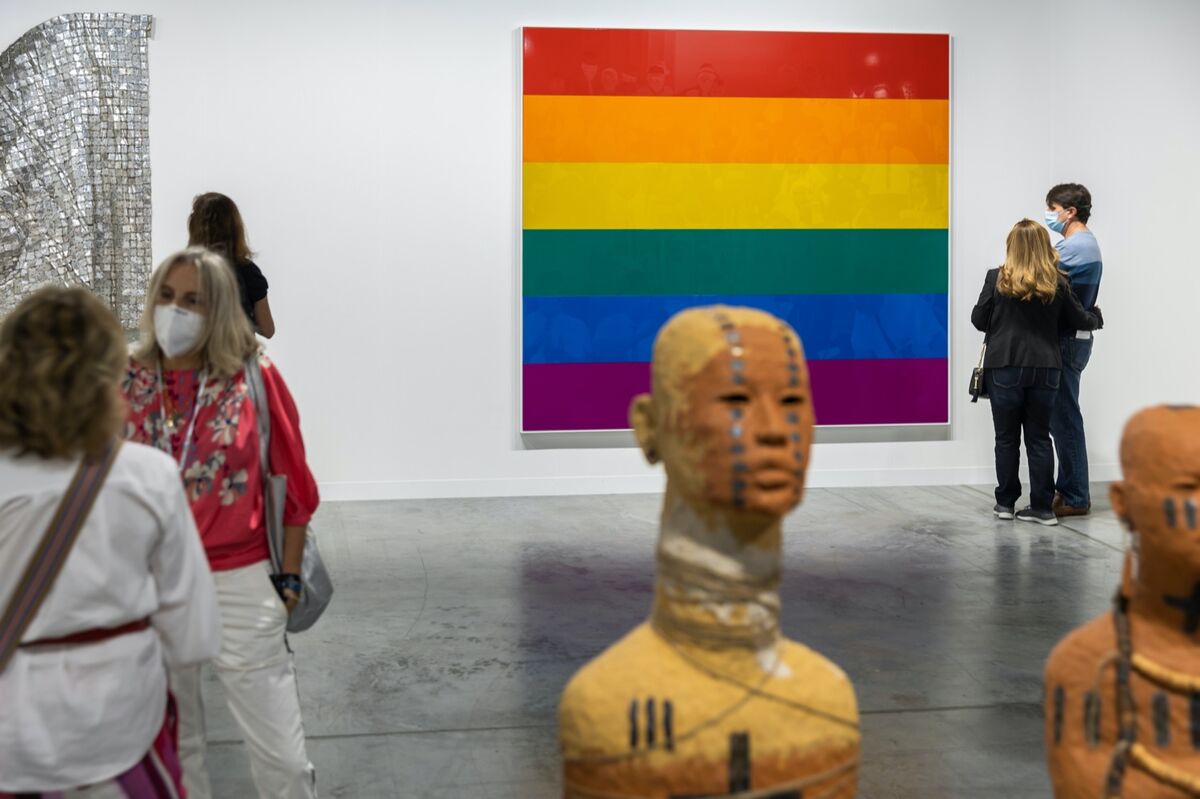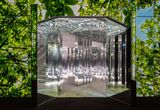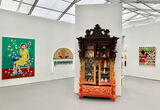Art Market
The Canvas: Amid Surging Sales at Art Basel in Miami Beach’s VIP Preview, a New Class of Collectors Emerge, Shifting the Market’s Taste with Them

Installation view of Jack Shainman’s booth at Art Basel Miami Beach 2021. Courtesy of Art Basel.
This Miami Art Week, Artsy is proud to be working with The Canvas, the premium art market newsletter, to deliver on-the-ground reporting from all the major fairs, including major sales, standout booths, and updates on what the art world’s top collectors and power-brokers are buzzing about and buying this year
If you’d like to receive more exclusive coverage from The Canvas and get access to the same insightful reporting that the art world’s leading blue-chip collectors rely on to navigate a rapidly shifting marketplace, we encourage you to subscribe and join their insider community.
When Art Basel last stormed the beaches of Miami back in December of 2019, all anyone could talk about was a certain hanging banana on the walls of Perrotin’s booth. Meanwhile, we were busy reporting on a growing number of exhibitors who were refusing to pay their invoices for the Hong Kong iteration of the fair out of fears that it might end up being cancelled due to reports of a mysterious virus coming out of Wuhan, China. (Spoiler alert: they were right.)
Oh, what a difference two years makes.
There’s a change in the air and anyone who was at Art Basel in Miami Beach’s First Choice preview yesterday must have surely felt it. Though Larry himself made the trip down and could be seen glad-handing collectors in his gallery’s booth for the first time in two years, and while Leo was spotted roaming through the aisles in his standard Basel uniform of sunglasses, hoodie, and baseball cap, the art world is hardly reverting back to its pre-pandemic normal.
Yes, that was Steve Wynn decked out in full Florida pink admiring the works in Acquavella’s booth. And yes, established collectors such as Maria Arena Bell, the Rubells, Peter Brant, the Mugrabis, Aby Rosen, and even Martha Stewart, all showed up on opening day. In fact, even mega-collector Bernard Arnault (who flew into Miami last minute with the entire Arnault clan in tow to attend the Louis Vuitton Men’s show after Virgil Abloh’s tragic death on Sunday) made time to stop by the convention center, which according to one knowledgeable insider we spoke to, was the first time the French billionaire attended any Art Basel fair in person. A shocking little factoid, we know.
But despite the attendance of the above, it would be hard to deny the sense that yesterday’s preview seemed to feature a far greater number of new and unknown faces than in years past. Some of this was by design, with fair organizers loosening long-held criteria required to exhibit—such as the need to maintain a physical gallery space year-round—as a way to diversify the fair’s DNA and shake things up for the better. And it was also at least partially due to the fair’s newly installed timed entry system which kept attendance from ballooning to unsustainable, COVID-risky levels; as well as the continued difficulty for Europe- and Asia-based collectors to travel into the U.S.
But regardless of the exact factors at play, the outcome was clear: The new school of collectors who have been dominating the market of late, the cohort propelling names like , , , and to the forefront of the market’s collective consciousness, far outnumbered the well-known collectors of past generations, who in many ways, were the ones responsible for helping to grow the art market to the lofty heights it’s currently enjoying in the first place. And these Young Turks did more than just hobnob and air kiss over flutes of Ruinart (in this regard at least, the art world apparently is back to normal), they were actively buying. And they were buying a lot.
Our full sales report will come out later this week, but as expected on the heels of this season’s blockbuster auctions in New York, galleries reported a surge of sales on the fair’s opening day. Victoria Miro had pre-sold Yukhnovich’s 2021 painting Bombshell for £150,000 as well as six minuscule 8-by-5-inch works on paper by the London-based artist for £15,000 each. ’s pastel and charcoal work on paper It’s Nothing (2021) sold for $250,000 out of Jack Shainman Gallery’s booth while Blum & Poe sold ’s motorized My Fault Your Fault work for $80,000.
Pace placed a 2007 work Landscape (Tree) III with a client for approximately $1 million and sold an untitled painting from 2021 by Brazilian artist , who the gallery added to its roster last year, for $100,000 to an unnamed institution. Kasmin sold ’s 1985 painting Mute Transformations 1985 for $300,000, a few short months after the gallery announced representation of the estate. And Lisson Gallery sold two sculptures by (whose solo show of new works opened at the ICA Miami this week) for $75,000 and $32,000, respectively.
Works on the higher end of the price range also continued to find surging demand. David Zwirner sold an painting from $1953 for over $7 million. Edward Tyler Nahem Fine Art placed a 1962 painting with a client for an asking price of $2.5 million. A painting by sold for $1.75 million out of ’s booth. And Mnuchin reported a string of high-priced sales including Basquiat’s Batman work on paper for $2.5 million, an painting for $1 million, a 1978 painting for $650,000, and a 1986 painting for $775,000. And over in Hauser & Wirth’s sprawling booth, a new painting, Going Out of my Mind, sold for approximately $1.4 million, tying an untitled 1940 painting by as the most expensive work the mega-gallery sold at this year’s fair thus far.
In perhaps the best illustration of just how far this new class of collector has come in being fully embraced by the established, blue-chip art world, The Canvas can exclusively reveal that the buyer of the Condo painting at Hauser & Wirth wasn’t an understated longtime client of the gallery who’s been attending Art Basel fairs for decades and slowly but surely amassed their collection over time, but was rather the Miami-based collector John Marquez who we’re incredibly excited to announce is featured in our second-annual “Collectors Issue” publishing this Sunday. Surprise! (Be on the lookout for more names being announced throughout the week and subscribe here if you haven’t already.)
An ICA Miami trustee, Marquez got his start in the art world buying and works approximately 10 years ago before switching to emerging contemporary artists around 2016. Since then, he’s built an impressive collection of over 500 works by some of the hottest artists in today’s market—names like Smith, Nava, , , , , and , just to name a few. He proudly posts pictures of the works in his collection on his Instagram profile which boasts over 10,000 followers. And following in the footsteps of esteemed Miami-based collectors like the Rubells, the Margulies family, and the de la Cruz family, he plans to make his collection open to the public in a converted warehouse in Allapattah which is set to open by Art Basel in Miami Beach 2022.
Marquez is a leading figure in Miami’s exploding collecting scene, many of whom gathered at the ICA in the Design District last night to toast the openings of the boutique-sized institution’s Fadojutimi, Hayden, and shows at a boozy party cohosted by W Magazine. Karlie Kloss, Derek Blasberg, Bill Powers, and Christie’s Los Angeles VP, Alex Marshall, were just a few of the many well-heeled guests in attendance throughout the night. And it’s clear that the museum—and the community of collectors that has sprung up around it in recent years—certainly has a lot to celebrate this week, with Alex Gartenfeld, the ICA’s 34-year-old artistic director, helping to orchestrate seven acquisitions for the museum from galleries exhibiting in Miami this week, including works by Johnson and from Hauser & Wirth, a piece by from L.A.’s Various Small Fires, and a work by through Château Shatto.
Ultimately, so long as they follow in the footsteps of the collecting giants of previous generations and resist the urge to sell works from their collections too early—an increasingly difficult temptation to resist given current prices—then this new generation of collectors could very well end up dictating the tastes and direction of the art market for many years to come.




No comments:
Post a Comment